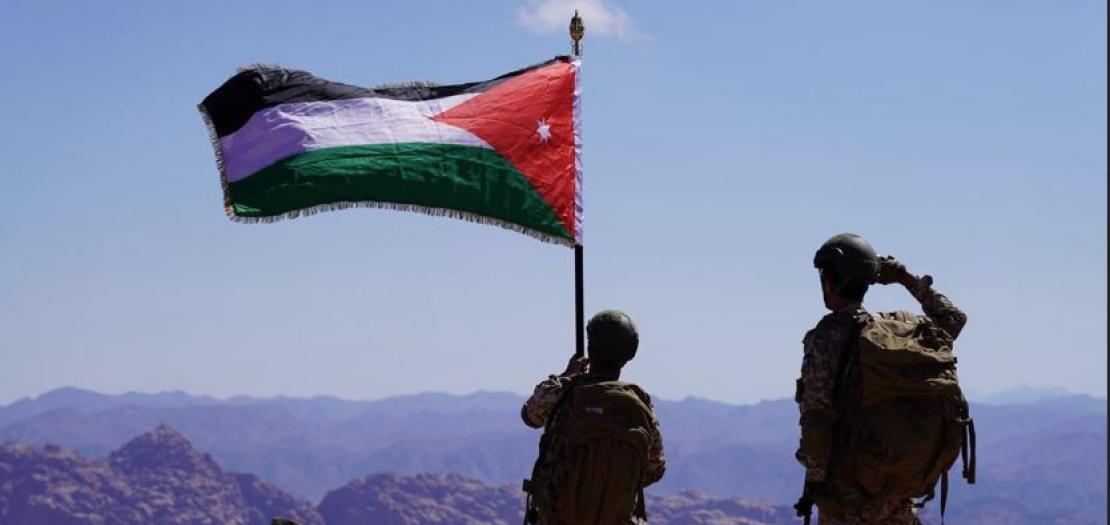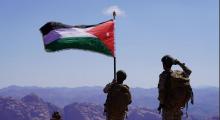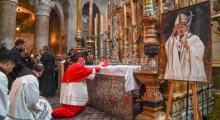Issued by the Catholic Center for Studies and Media - Jordan. Editor-in-chief Fr. Rif'at Bader - موقع أبونا abouna.org

Christian religious leaders, along with intellectual elites from both Christian and Muslim backgrounds, are arriving to the beloved Jordan to participate in a consultative intellectual meeting on the topic: “Christians in the Arab Levant and the Aspirations of Unity and Enlightenment.” The meeting will reflect on priority issues in public life in the Antiochian-Arab Levant, issues directly related to the destiny and future of our peoples.
This intellectual event is organized by the Royal Institute for Inter-Faith Studies and held under the patronage and with the participation of His Royal Highness Prince El Hassan Ibn Talal, chairperson of the institute’s board of trustees.
The focus of the meeting is the dignity and rights of peoples from a Christian-Islamic perspective; religion and politics between secularism and political instrumentalization of religion; ethics from a religious standpoint; the shared Christian-Islamic heritage and overarching Levantine Arab identity; and unity, diversity, and pluralism in the Levant.
The overall theme of the meeting and the subjects of its sessions clearly indicate a deep awareness on the part of the leadership of the Hashemite Kingdom of Jordan, foremost among them His Majesty King Abdullah II, and the Institute’s leadership, of the importance of the diversity present in modern societies, as well as the importance of observing and managing its dynamics wisely.
In addition, the meeting reflects deep affection and appreciation on the part of Jordanian authorities toward Christians, a sentiment that is not new. This noble family has demonstrated humanity and love toward Christians since the days of their ancestor, His Majesty Sharif Hussein bin Ali of Mecca, who is credited with saving those who fled Ottoman massacres, Armenians and Syriacs, by taking refuge in northern Syria.
Compassion, aid for the afflicted, empathy, and human brotherhood are traits this noble family upholds, values passed down from generation to generation, taught within the family, from father to son and from grandfather to grandson. This is something we have observed in over a quarter century of interfaith dialogue work in the National Islamic-Christian Dialogue Committee in Lebanon: these values are primarily instilled within the family before being taught in school or acquired through socialization. It is nearly impossible for open-minded parents to raise closed-minded or fanatical children, and vice versa.
The leadership in the Kingdom has realized that social stability is not difficult to achieve when matters are wisely managed by sound leadership and governmental institutions that treat people with fairness and integrity. The root of most global conflicts lies in rights-related issues, and social stability can only be achieved through the establishment of justice.
In this context, our decades of research on persecution and massacres in the Antiochian-Arab Levant and Anatolia have shown that His Majesty Sharif Hussein Ibn Ali of Mecca played a major role in rescuing thousands of Armenians and Syriacs who fled to northern Syria. His message to the Arab armies stationed there has entered the history of honorable documents, as he was a pioneer of human fraternity long before the existence of the Universal Declaration of Human Rights or similar treaties.
What this visionary humanitarian leader did deserves close study, analysis, and public dissemination, first, to honor his memory as it deserves; second, to offer his rescue initiative as an example to follow; and third, to say to the West that we are civilized peoples who have produced men of great humanity at a time when genocide was a common practice between communities and survival was for the strongest.
It is worth noting that what Sharif Hussein Ibn Ali of Mecca did may be the subject of an upcoming conference currently under study.
The Middle East Council of Churches, which has worked in the field of social dialogue since its founding half a century ago and regards dialogue and fraternity as essential human values, highly appreciates the initiative of those responsible for the Royal Institute for Inter-Faith Studies, honors the legacy of its founding grandfather, commends this approach in understanding matters, and praises the way this nation’s leadership manages affairs, with an aim to preserving social stability, which is the first and essential condition for social development and welfare.
We pray to Almighty God to enlighten minds around the world, to place clarity and peace in people’s hearts, to eliminate all forms of discrimination, and to extinguish the hate speech that finds fertile ground in modern societies. And we say to them what the Lord Jesus Christ said in His Sermon on the Mount:
“Blessed are the peacemakers, for they shall be called children of God.”
May God preserve this blessed Kingdom and its leaders, and may its progress continue, for it is a vital pillar of balance in the region.







